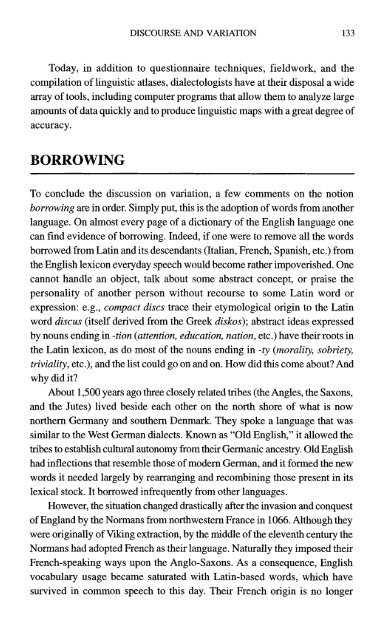A Basic Course in Anthropological Linguistics (Studies in Linguistic ...
A Basic Course in Anthropological Linguistics (Studies in Linguistic ...
A Basic Course in Anthropological Linguistics (Studies in Linguistic ...
Create successful ePaper yourself
Turn your PDF publications into a flip-book with our unique Google optimized e-Paper software.
DISCOURSE AND VARLATION 133<br />
Today, <strong>in</strong> addition to questionnaire techniques, fieldwork, and the<br />
compilation of l<strong>in</strong>guistic atlases, dialectologists have at their disposal a wide<br />
array of tools, <strong>in</strong>clud<strong>in</strong>g computer programs that allow them to analyze large<br />
amounts of data quickly and to produce l<strong>in</strong>guistic maps with a great degree of<br />
accuracy.<br />
BORROWING<br />
To conclude the discussion on variation, a few comments on the notion<br />
borrow<strong>in</strong>g are <strong>in</strong> order. Simply put, this is the adoption of words from another<br />
language. On almost every page of a dictionary of the English language one<br />
can f<strong>in</strong>d evidence of borrow<strong>in</strong>g. Indeed, if one were to remove all the words<br />
borrowed from Lat<strong>in</strong> and its descendants (Italian, French, Spanish, etc.) from<br />
the English lexicon everyday speech would become rather impoverished. One<br />
cannot handle an object, talk about some abstract concept, or praise the<br />
personality of another person without recourse to some Lat<strong>in</strong> word or<br />
expression: e.g., compact discs trace their etymological orig<strong>in</strong> to the Lat<strong>in</strong><br />
word discus (itself derived from the Greek diskos); abstract ideas expressed<br />
by nouns end<strong>in</strong>g <strong>in</strong> -tion (attention, education, nation, etc.) have their roots <strong>in</strong><br />
the Lat<strong>in</strong> lexicon, as do most of the nouns end<strong>in</strong>g <strong>in</strong> -ty (mordity, sobriety,<br />
triviality, etc.), and the list could go on and on. How did this come about? And<br />
why did it?<br />
About 1,500 years ago three closely related tribes (the Angles, the Saxons,<br />
and the Jutes) lived beside each other on the north shore of what is now<br />
northern Germany and southern Denmark. They spoke a language that was<br />
similar to the West German dialects. Known as “Old English,” it allowed the<br />
tribes to establish cultural autonomy from their Germanic ancestry. Old English<br />
had <strong>in</strong>flections that resemble those of modern German, and it formed the new<br />
words it needed largely by rearrang<strong>in</strong>g and recomb<strong>in</strong><strong>in</strong>g those present <strong>in</strong> its<br />
lexical stock. It borrowed <strong>in</strong>frequently from other languages.<br />
However, the situation changed drastically after the <strong>in</strong>vasion and conquest<br />
of England by the Normans from northwestern France <strong>in</strong> 1066. Although they<br />
were orig<strong>in</strong>ally of Vik<strong>in</strong>g extraction, by the middle of the eleventh century the<br />
Normans had adopted French as their language. Naturally they imposed their<br />
French-speak<strong>in</strong>g ways upon the Anglo-Saxons. As a consequence, English<br />
vocabulary usage became saturated with Lat<strong>in</strong>-based words, which have<br />
survived <strong>in</strong> common speech to this day. Their French orig<strong>in</strong> is no longer






